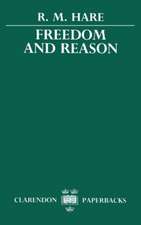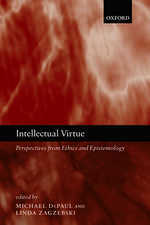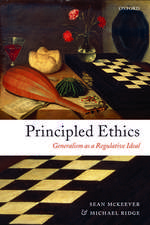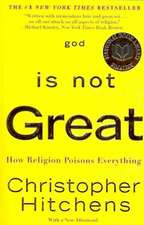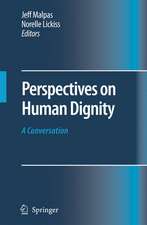Evil and Silence: Media and Power
Autor Richard Flemingen Limba Engleză Hardback – 30 sep 2009
Preț: 872.70 lei
Preț vechi: 1176.45 lei
-26% Nou
Puncte Express: 1309
Preț estimativ în valută:
166.99€ • 174.82$ • 138.17£
166.99€ • 174.82$ • 138.17£
Carte tipărită la comandă
Livrare economică 05-19 aprilie
Preluare comenzi: 021 569.72.76
Specificații
ISBN-13: 9781594517280
ISBN-10: 1594517282
Pagini: 157
Dimensiuni: 129 x 198 x 15 mm
Greutate: 0.29 kg
Ediția:1
Editura: Taylor & Francis
Colecția Routledge
Seria Media and Power
Locul publicării:Oxford, United Kingdom
ISBN-10: 1594517282
Pagini: 157
Dimensiuni: 129 x 198 x 15 mm
Greutate: 0.29 kg
Ediția:1
Editura: Taylor & Francis
Colecția Routledge
Seria Media and Power
Locul publicării:Oxford, United Kingdom
Recenzii
“In Evil and Silence, Richard Fleming shows the value of a careful and caring use of philosophical thinking forced by a collusion of these issues. Fleming provides a sense of how to understand the consuming miseries of our world through concentrated attention to ways we give expression to ourselves and listen to the sounds around us. I feel grateful to him.”
—Stanley Cavell, Harvard University
“Richard Fleming writes in a voice unique among contemporary American philosophers. He is unlikely to be read much by the professional philosophers who dominate the academy. Yet his learning is large and generous, and his debts to writers like Wittgenstein and Cavell are well-incurred. He manages to take risks and yet remain calm and even-tempered in his raids on the inarticulate. His prose upsets our cultural certainties, without being aggressive. He manages to be out of step with almost every trend I can think of. The one trend he consistently stays true to is the strain of American simplicity (which is anything but simple) that runs from Emily Dickinson and Henry Thoreau down to Beckett and (he would argue) John Cage. His questions continue to throb: How do we approach the everyday, if we are already there?”
—Timothy Gould, Department of Philosophy, Metropolitan State College of Denver
“Not an interpretation of Austin’s or Cavell’s or Wittgenstein’s ordinary language philosophy but the continuation of it, a trial of how far acknowledging our common forms of speech and action can take anyone, how far toward disentangling our violence, injustice, unfreedom—Richard Fleming’s philosophical exercises seek peace on just these terms. That speaking presumes stillness, that silence resists us, that evil goes unfought unless accepted, to such austere conditions his words remain responsible. A sequel to First Word Philosophy, Fleming’s Evil and Silence undoes the confusions we have become. All that’s ordinary here is everything.”
—Ralph M. Berry, Chair of the Department of English, Florida State University
—Stanley Cavell, Harvard University
“Richard Fleming writes in a voice unique among contemporary American philosophers. He is unlikely to be read much by the professional philosophers who dominate the academy. Yet his learning is large and generous, and his debts to writers like Wittgenstein and Cavell are well-incurred. He manages to take risks and yet remain calm and even-tempered in his raids on the inarticulate. His prose upsets our cultural certainties, without being aggressive. He manages to be out of step with almost every trend I can think of. The one trend he consistently stays true to is the strain of American simplicity (which is anything but simple) that runs from Emily Dickinson and Henry Thoreau down to Beckett and (he would argue) John Cage. His questions continue to throb: How do we approach the everyday, if we are already there?”
—Timothy Gould, Department of Philosophy, Metropolitan State College of Denver
“Not an interpretation of Austin’s or Cavell’s or Wittgenstein’s ordinary language philosophy but the continuation of it, a trial of how far acknowledging our common forms of speech and action can take anyone, how far toward disentangling our violence, injustice, unfreedom—Richard Fleming’s philosophical exercises seek peace on just these terms. That speaking presumes stillness, that silence resists us, that evil goes unfought unless accepted, to such austere conditions his words remain responsible. A sequel to First Word Philosophy, Fleming’s Evil and Silence undoes the confusions we have become. All that’s ordinary here is everything.”
—Ralph M. Berry, Chair of the Department of English, Florida State University
Cuprins
Chapter Just Plain Evil; Chapter Ordinary Silence; Chapter Supplements to First and Second Books; Chapter 1 Words Not My Own; Chapter 2 Extended Contents; Chapter 3 Dark Matters; Chapter 4 Reading the Dictionary; Chapter 5 Pro and Contra; Chapter 6 Musical Illustrations;
Descriere
Inspired by Ludwig Wittgenstein and Stanley Cavell, this book is a profoundly original philosophical work put together as a network of quotations, to show that our language is never our own and that ethics can be understood as an effect of our attitude to language


















